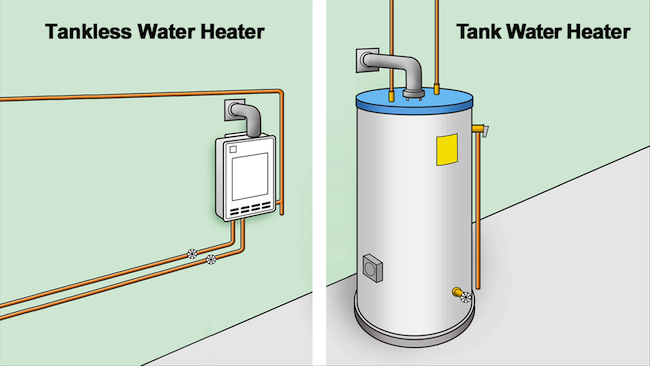
Water heaters are an expensive purchase that you’ll have to live with for over a decade. When replacing your old water heater, think about the cost, efficiency, and lifetime of your new water heater. Let’s check out the advantages and disadvantages of tankless and tank storage water heater so you can make an educated decision.
What’s a Tankless Water Heaters?
High-powered heating unit heats water quickly as it passes through a heat exchanger in tankless water heater. In Consumer Reports tests, these types of water heater turned out to be 22 percent more energy efficient on average than gas-fired storage-tank versions. In case you notice any issue with your heating unit, call out experts for heating repair in Staten Island.
How are “Traditional” Tank Storage Water Heaters Different?
Most of the households have storage tank water heater. They either use natural gas or electricity as a source of energy. Natural gas storage-tank water heater consume nearly half as much energy as electric water heater and cost half as much to operate. They do, however, cost a little more than electric versions. To keep the heating unit, hire experts for heating repair in Queens.
Tankless Water Heaters Energy Efficiency
On-demand (tankless) hot water that consumes less than 41 gallons of hot water per day can save homeowners between 24-34% in energy costs. If you install a tankless water heater at all the hot water outlets, you can save between 27 and 50 percent on electricity.
Pros & Cons of Tankless Water Heaters
On-demand (tankless) water heater have both advantages and disadvantages, just like any other product.
Advantages:
Tankless water heater generally last 20 to 30 years, which is twice as long as the expected usable life of a storage tank water heater. You’ll have hot water anytime you need it with on-demand water heating, which may be tiny and put in “tight quarters.” The longer a gas-fired tank is in use, the more money it saves the homeowner. Electric tankless water boilers still save around $44 per year on average.
Drawbacks:
A tankless water heater installation might be expensive if you’re replacing a storage tank water heater with a tankless-type water heater. If you have numerous showers in your home, one of the shower-takers is bound to get a “chilly” sensation. Because of the difficulty of relocating existing pipe, you may need to install a new water heater that is more expensive than a tankless one.
Storage Tank Water Heater Advantages and Disadvantages (Tank) Water Heater
Advantages:
Storage tank water heater offer a significantly lower starting cost. Storage tank water heater are easier to run than tankless models, resulting in lower maintenance and repair costs. When these water heater go down, their less complex design provides for simple, low-cost heating system repair. Repairing and replacing tankless water heater is more difficult and expensive.
Drawbacks:
Because of its size, storage tank water heater might take up more room. If you take numerous showers frequently, you may need a bigger water heater. If you don’t have enough room in your home, you’ll have trouble finding a suitable location for storage tank water heating. Storage tank types have a shorter usable life, generally 10 to 15 years (approximately a quarter of the life of an on-demand water heater). In addition, they must be changed twice as frequently as tankless water heaters.

Simone Arnica is the certified and more than 35 years experienced HVAC expert from Arnica Heating and Air Conditioning Inc. suggesting maintenance tips for the HVAC system to protect it from early damage, unwanted maintenance cost and also to save on energy cost. Follow the blog to learn how it can be done easily.




Leave a Reply
You must be logged in to post a comment.